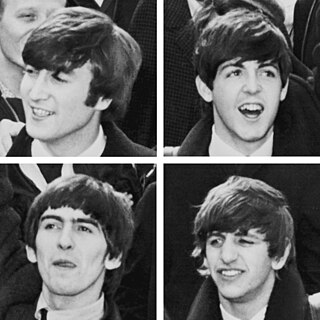
The Beatles were an English rock band formed in Liverpool in 1960, comprising John Lennon, Paul McCartney, George Harrison and Ringo Starr. They are regarded as the most influential band of all time and were integral to the development of 1960s counterculture and the recognition of popular music as an art form. Rooted in skiffle, beat and 1950s rock 'n' roll, their sound incorporated elements of classical music and traditional pop in innovative ways. The band also explored music styles ranging from folk and Indian music to psychedelia and hard rock. As pioneers in recording, songwriting and artistic presentation, the Beatles revolutionized many aspects of the music industry and were often publicized as leaders of the era's youth and sociocultural movements.

Please Please Me is the debut studio album by the English rock band the Beatles. Produced by George Martin, it was released in the UK on EMI's Parlophone label on 22 March 1963. The album is 14 songs in length, and contains a mixture of cover songs and original material written by the partnership of band members John Lennon and Paul McCartney.
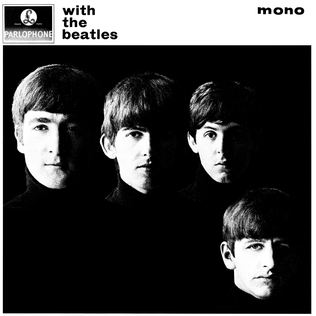
With the Beatles is the second studio album by the English rock band the Beatles. It was released in the United Kingdom on 22 November 1963 on Parlophone, eight months after the band's debut Please Please Me. Produced by George Martin, the album features eight original compositions and six covers. The sessions also yielded the non-album single, "I Want to Hold Your Hand" backed by "This Boy". The cover photograph was taken by the fashion photographer Robert Freeman and has since been mimicked by several music groups. A different cover was used for the Australian release of the album, which the Beatles were displeased with.

Sir George Henry Martin was an English record producer, arranger, composer, conductor, and musician. He was commonly referred to as the "Fifth Beatle" because of his extensive involvement in each of the Beatles' original albums. Martin's formal musical expertise and interest in novel recording practices facilitated the group's rudimentary musical education and desire for new musical sounds to record. Most of their orchestral and string arrangements were written by Martin, and he played piano or keyboards on a number of their records. Their collaborations resulted in popular, highly acclaimed records with innovative sounds, such as the 1967 album Sgt. Pepper's Lonely Hearts Club Band—the first rock album to win a Grammy Award for Album of the Year.

Derek Wyn Taylor was a British journalist, writer, publicist and record producer. He is best known for his role as press officer to the Beatles, with whom he worked in 1964 and then from 1968 to 1970, and was one of several associates to earn the moniker "the Fifth Beatle". Before returning to London to head the publicity for the Beatles' Apple Corps organisation in 1968, he worked as the publicist for California-based bands such as the Byrds, the Beach Boys and the Mamas and the Papas. Taylor was known for his forward-thinking and extravagant promotional campaigns, exemplified in taglines such as "The Beatles Are Coming" and "Brian Wilson Is a Genius". He was equally dedicated to the 1967 Summer of Love ethos and helped stage that year's Monterey Pop Festival.

Dick James was a British music publisher and singer. He and Brian Epstein established the Beatles' publisher Northern Songs. Later, with his son Stephen, James founded the DJM record label and recording studios, which signed Elton John and Bernie Taupin.

A Collection of Beatles Oldies is a compilation album by the English rock band the Beatles. Released in the United Kingdom in December 1966, it features hit singles and other songs issued by the group between 1963 and 1966. The compilation served as a stopgap release to satisfy EMI's demand for product during the Christmas period, since the Beatles had only begun recording Sgt. Pepper's Lonely Hearts Club Band, the follow-up to their Revolver album, late the previous month. It was the band's first official greatest hits collection, although the Beatles had no involvement in the album.

"From Me to You" is a song by the English rock band the Beatles that was released in April 1963 as their third single. It was written by John Lennon and Paul McCartney. The song was the Beatles' first number 1 hit on what became the official UK singles chart but the second, after "Please Please Me", on most of the other singles charts published in the UK at the time. "From Me to You" failed to make an impact in the United States at the time of its initial release. Instead, a 1963 cover version released by Del Shannon resulted in the song's becoming the first Lennon–McCartney track to enter the US pop charts. The Beatles' original was rereleased in the US in January 1964 as the B-side to "Please Please Me", and reached number 41.
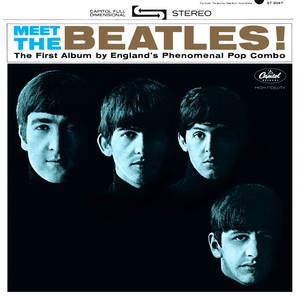
Meet the Beatles! is a studio album by the English rock band the Beatles, released as their second album in the United States. It was the group's first American album to be issued by Capitol Records, on 20 January 1964 in both mono and stereo formats. It topped the popular album chart on 15 February 1964 and remained at number one for eleven weeks before being replaced by The Beatles' Second Album. The cover featured Robert Freeman's iconic portrait of the Beatles used in the United Kingdom for With the Beatles, with a blue tint added to the original stark black-and-white photograph.

Introducing... The Beatles is the first studio album released by the English rock band the Beatles in the United States. Originally scheduled for a July 1963 release, the LP came out on 10 January 1964, on Vee-Jay Records, ten days before Capitol's Meet the Beatles!. The latter album, however, entered the U.S. album chart one week before the former. Consequently, when Meet The Beatles! peaked at No. 1 for eleven consecutive weeks, Introducing...The Beatles stalled at No. 2 where it remained for nine consecutive weeks. It was the subject of much legal wrangling, but ultimately, Vee-Jay was permitted to sell the album until late 1964, by which time it had sold more than 1.3 million copies. On 24 July 2014 the album was certified gold and platinum by the RIAA.
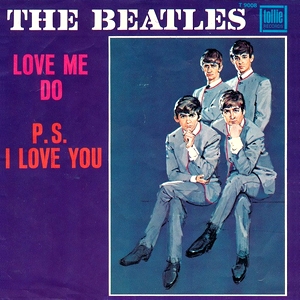
"Love Me Do" is the debut single by the English rock band the Beatles, backed by "P.S. I Love You". When the single was originally released in the United Kingdom on 5 October 1962, it peaked at number 17. It was released in the United States in 1964 and topped the nation's song chart. Re-released in 1982 as part of EMI's Beatles 20th anniversary, it re-entered the UK charts and peaked at number 4. "Love Me Do" also topped the charts in Australia and New Zealand.

"Please Please Me" is a song released by the English rock band the Beatles. It was their second single in the United Kingdom, and their first in the United States. It is also the title track of their first LP, which was recorded to capitalise on the success of the single. It is a John Lennon composition, although its ultimate form was significantly influenced by producer George Martin.
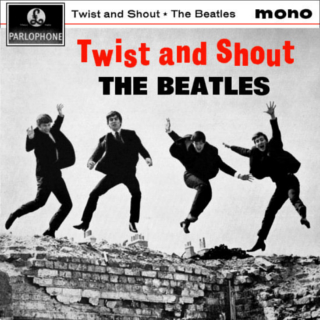
Twist and Shout is the first UK extended play by the English rock band the Beatles, released in the UK on EMI's Parlophone label on 12 July 1963. It contains four tracks produced by George Martin that were previously released on the band's debut album Please Please Me. Rush-released to meet public appetite, the record topped the UK EP chart for twenty-one weeks, the biggest-selling EP of all time in the UK to that point, and became so successful that it registered on the NME Singles Chart, peaking at number four. The EP's cover photograph, featuring the Beatles jumping in a London bombsite, has been described by The Telegraph as "one of the key images of the 1960s".
William Harry is the creator of Mersey Beat, a newspaper of the early 1960s which focused on the Liverpool music scene. Harry had previously started various magazines and newspapers, such as Biped and Premier, while at Liverpool's Junior School of Art. He later attended the Liverpool College of Art, where his fellow students included John Lennon and Stuart Sutcliffe, who both later performed with the Beatles. He published a magazine, Jazz, in 1958, and worked as an assistant editor on the University of Liverpool's charity magazine, Pantosphinx.
"More popular than Jesus" is part of a remark made by John Lennon of the Beatles in a March 1966 interview in which he argued that the public were more infatuated with the band than with Jesus and that Christian faith was declining to the extent that it might be outlasted by rock music. His opinions drew little controversy when originally published in the London newspaper The Evening Standard, but drew angry reactions from Christian communities when republished in the United States that July.

Trouser Press was a rock and roll magazine started in New York in 1974 as a mimeographed fanzine by editor/publisher Ira Robbins, fellow fan of the Who, Dave Schulps, and Karen Rose under the name "Trans-Oceanic Trouser Press". Publication of the magazine ceased in 1984. The unexpired portion of mail subscriptions was completed by Rolling Stone sister publication Record, which itself folded in 1985. Trouser Press has continued to exist in various formats.

Record Collector is a British monthly music magazine focussing on rare and collectable records, and the bands who recorded them. It was founded in Sept 1979 and distributes worldwide. It is promoted as "the world’s leading authority on rare and collectable records" and claims to be currently "the UK’s longest-running music magazine".
The Beatles experienced huge popularity on the British record charts in early 1963, but record companies in the United States did not immediately follow up with releases of their own, and the Beatles' commercial success in the US continued to be hampered by other obstacles, including issues with royalties and public derision toward the "Beatle haircut".
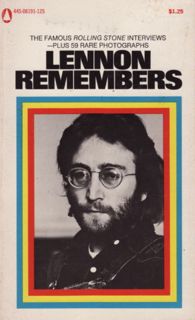
Lennon Remembers is a 1971 book by Rolling Stone magazine co-founder and editor Jann Wenner. It consists of a lengthy interview that Wenner carried out with former Beatle John Lennon in December 1970 and which was originally serialised in Rolling Stone in its issues dated 21 January and 4 February 1971. The interview was intended to promote Lennon's primal therapy-inspired album John Lennon/Plastic Ono Band and reflects the singer's emotions and mindset after undergoing an intense course of the therapy under Arthur Janov. It also serves as a rebuttal to Paul McCartney's public announcement of the Beatles' break-up, in April 1970.
Sean O'Mahony was a British music writer and magazine editor. He worked as a music journalist in the 1960s under the name Johnny Dean, and was the founder and editor of Beat Instrumental, The Beatles Book, and Record Collector magazines.















